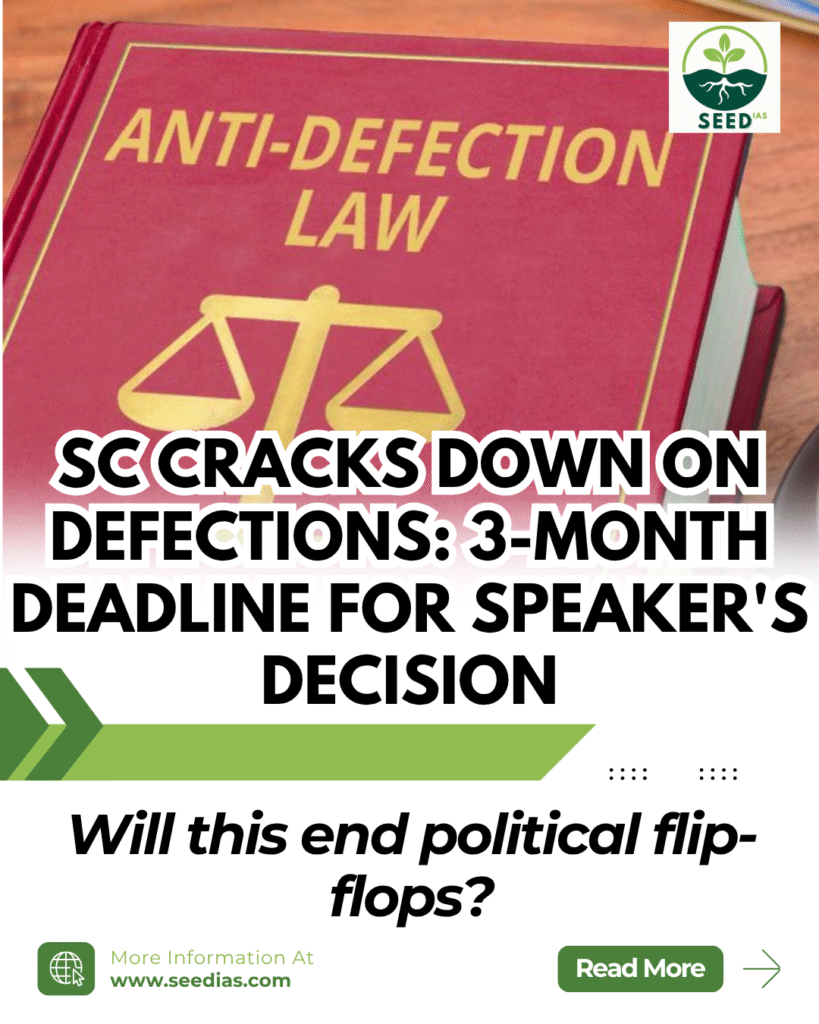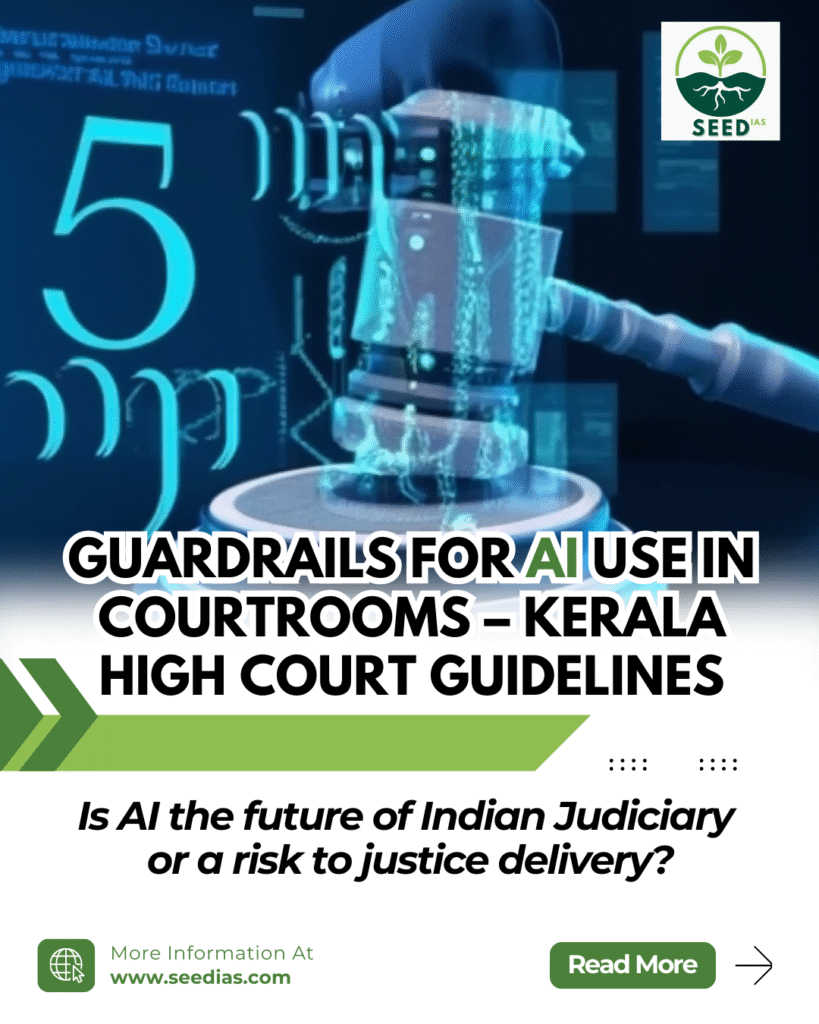Why in NEWS
The Supreme Court, in Padi Kaushik Reddy v. State of Telangana (2025), criticized the Telangana Assembly Speaker for delaying disqualification of defected MLAs and set a 3-month deadline for a decision, reigniting debate on India’s anti-defection law.
Key Terms/Concepts
| Term | Explanation |
|---|---|
| Defection | Abandoning one’s political party, often for personal or political gain. |
| Anti-Defection Law | Law to prevent political defections, added via 52nd Constitutional Amendment in 1985 (Tenth Schedule). |
| Party Whip | An official order issued by a political party directing members to vote in a particular way. |
| Tenth Schedule | Constitutional provision dealing with disqualification on grounds of defection. |
| Speaker’s Role | Decides disqualification petitions under the Tenth Schedule. |
| 91st Amendment Act (2003) | Removed one-third split provision; allows merger only with two-thirds support. |
News Summary
| Aspect | Details |
|---|---|
| Case Name | Padi Kaushik Reddy v. State of Telangana (2025) |
| Court’s Observation | SC criticized delay in disqualification proceedings and gave a 3-month deadline. |
| Larger Concern | Delay undermines the purpose of anti-defection law and raises questions on Speaker’s neutrality. |
| Legal Basis | Tenth Schedule of Constitution; amended by 91st Constitutional Amendment. |
| Background Phrase | “Aaya Ram, Gaya Ram” — became famous in the 1960s due to frequent defections. |
Key Features of Anti-Defection Law
| Category | Provisions |
|---|---|
| Grounds for Disqualification | Voluntarily giving up party membership (even inferred from behavior), or defying party whip. |
| Independents & Nominated Members | Independents disqualified if they join any party; nominated members if they join a party after 6 months. |
| Exceptions | Party mergers allowed without disqualification if two-thirds agree; Speakers resigning from party not disqualified. |
| Authority | Speaker/Chairman of the House decides disqualification petitions. |
Criticisms of the Law
| Criticism | Explanation |
|---|---|
| Curb on Dissent | Prevents legislators from voting according to conscience or constituency. |
| Speaker’s Bias | Delays and lack of neutrality due to party affiliations. |
| No Time Limit | Law does not mandate a deadline for decisions. |
| Horse Trading Enabled | Two-thirds clause allows unethical switching. |
| Whip Opacity | Lack of clear communication of party whips leads to confusion. |
Supreme Court’s Position
| Case | Key Ruling |
|---|---|
| Keisham Meghachandra Singh (2020) | Directed Speakers to decide within 3 months; recommended independent tribunal. |
| Ravi S. Naik (1994) | Speaker must be neutral; disqualification possible without formal resignation. |
| Kihoto Hollohan (1992) | Speaker’s decision subject to judicial review if malafide or unconstitutional. |
| Padi Kaushik Reddy (2025) | Parliament urged to reform Speaker’s powers for fairer enforcement. |
Reforms Suggested
| Recommendation | Description |
|---|---|
| Narrow the Scope | Limit disqualification to votes impacting government stability (e.g., no-confidence). |
| Shift Decision Authority | Transfer power from Speaker to EC or tribunal, as recommended by ARC. |
| Fixed Timeline | Mandatory deadline for decisions to prevent misuse. |
| Promote Intra-Party Democracy | Encourage internal debate, as per Law Commission (170th Report). |
| Improve Transparency | Make whip communication public via newspapers/electronic media. |
| Time-Bound Process | Committees like Dinesh Goswami (1990) & Law Commission (1999, 2015) demand transparent, speedy trials. |
In a nutshell
Memory Code – “3M SC FIX”
→ 3 Months Deadline, Supreme Court Intervention, Fixing Bias in Speaker’s Role
Prelims Questions
- The Anti-Defection Law was added to the Constitution through:
(a) 42nd Amendment
(b) 44th Amendment
(c) 52nd Amendment
(d) 91st Amendment - Which of the following is NOT a ground for disqualification under the Anti-Defection Law?
(a) Voting against party whip
(b) Joining a political party after winning as an independent
(c) Publicly criticizing one’s own party
(d) Joining a party within 6 months as a nominated member - The Supreme Court in which of the following cases ruled that Speaker’s decisions under the anti-defection law are subject to judicial review?
(a) Kesavananda Bharati v. State of Kerala
(b) Kihoto Hollohan v. Zachillhu
(c) Golaknath v. State of Punjab
(d) Indira Sawhney v. Union of India
Mains Questions
- Critically examine the challenges in the implementation of the Anti-Defection Law in India. Suggest reforms to make it more effective. 15 Marks (GS2 – Polity)
- Discuss the role of the Speaker in defection cases under the Tenth Schedule. Should this authority be transferred to an independent body? 10 Marks (GS2 – Governance)
Prelims Answer Key
| Q No. | Answer | Explanation |
|---|---|---|
| 1 | (c) | 52nd Amendment (1985) introduced the Tenth Schedule. |
| 2 | (c) | Criticizing one’s party is not a ground unless it shows giving up party membership. |
| 3 | (b) | Kihoto Hollohan case allowed judicial review of Speaker’s disqualification decisions. |
















